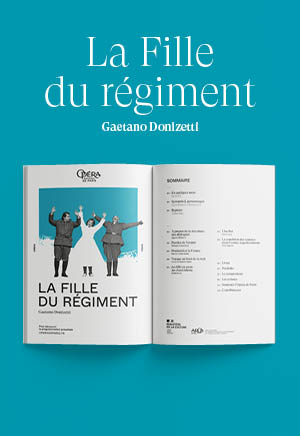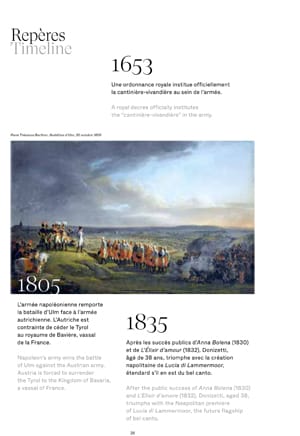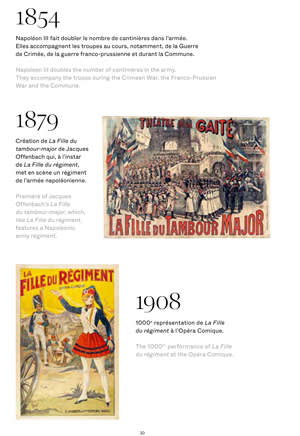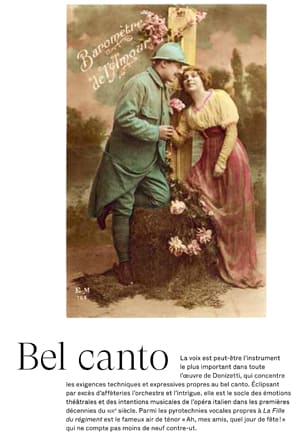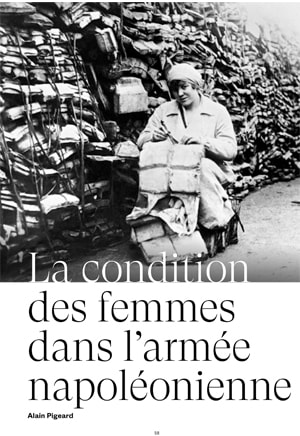Synopsis
Listen to the synopsis
In 1838, Gaetano Donizetti moved to Paris after a career already rich in works such as Lucia di Lammermoor, when he received a commission from the Opéra-Comique. La Fille du régiment, his first work written directly in French, premiered there two years later and gave the composer the opportunity to explore a broad range of musical styles, from the boisterous overture to bravura arias such as “Ah! mes amis” and poignant, languorous romances.
Foreshadowing Offenbach, this military opera about a vivandière, Marie, adopted at birth by a French regiment, doubles as a sentimental fable and a comic confrontation between two opposing worlds, that of the military encampment and that of the aristocracy.
Laurent Pelly takes on this pinnacle of bel canto with his characteristic verve. Setting the work during the 1914 war rather than the Napoleonic Wars and adapting the dialogue, the director modernises the piece without sacrificing a single ounce of its brio.
Artists
Comic opera in two acts (1840)
Opéra-comique en deux actes
Creative team
Cast
The Paris Opera Orchestra and Chorus
A production Metropolitan Opera, New York, Royal Opera House Covent Garden, London, Staatsoper, Vienna
Media


Watch the November 6 performance in replay on POP!
Available until December 6, 2024.
Access and services
Opéra Bastille
Place de la Bastille
75012 Paris
Public transport
Underground Bastille (lignes 1, 5 et 8), Gare de Lyon (RER)
Bus 29, 69, 76, 86, 87, 91, N01, N02, N11, N16
Calculate my routeCar park
Parking Indigo Opéra Bastille 1 avenue Daumesnil 75012 Paris
Book your spot at a reduced price-
Cloakrooms
Free cloakrooms are at your disposal. The comprehensive list of prohibited items is available here.
-
Bars
Reservation of drinks and light refreshments for the intervals is possible online up to 24 hours prior to your visit, or at the bars before each performance.
-
Parking
You can park your car at the Indigo Opéra Bastille. It is located at 1 avenue Daumesnil, 75012 Paris.
In both our venues, discounted tickets are sold at the box offices from 30 minutes before the show:
- €35 tickets for under-28s, unemployed people (with documentary proof less than 3 months old) and senior citizens over 65 with non-taxable income (proof of tax exemption for the current year required)
- €70 tickets for senior citizens over 65
Get samples of the operas and ballets at the Paris Opera gift shops: programmes, books, recordings, and also stationery, jewellery, shirts, homeware and honey from Paris Opera.
Opéra Bastille
- Open 1h before performances and until performances end
- Get in from within the theatre’s public areas
- For more information: +33 1 40 01 17 82
Online
Opéra Bastille
Place de la Bastille
75012 Paris
Public transport
Underground Bastille (lignes 1, 5 et 8), Gare de Lyon (RER)
Bus 29, 69, 76, 86, 87, 91, N01, N02, N11, N16
Calculate my routeCar park
Parking Indigo Opéra Bastille 1 avenue Daumesnil 75012 Paris
Book your spot at a reduced price-
Cloakrooms
Free cloakrooms are at your disposal. The comprehensive list of prohibited items is available here.
-
Bars
Reservation of drinks and light refreshments for the intervals is possible online up to 24 hours prior to your visit, or at the bars before each performance.
-
Parking
You can park your car at the Indigo Opéra Bastille. It is located at 1 avenue Daumesnil, 75012 Paris.
In both our venues, discounted tickets are sold at the box offices from 30 minutes before the show:
- €35 tickets for under-28s, unemployed people (with documentary proof less than 3 months old) and senior citizens over 65 with non-taxable income (proof of tax exemption for the current year required)
- €70 tickets for senior citizens over 65
Get samples of the operas and ballets at the Paris Opera gift shops: programmes, books, recordings, and also stationery, jewellery, shirts, homeware and honey from Paris Opera.
Opéra Bastille
- Open 1h before performances and until performances end
- Get in from within the theatre’s public areas
- For more information: +33 1 40 01 17 82
Online

Discover opera and ballet in another way

Dive into the Opera world and get insights on opera and pop culture or ballet and cinema. Scan this code to access all the quiz and blindtests on your mobile.

3 min
La Fille du régiment
La Fille du régiment: the true/false story
Here’s the unusual story of an orphan born from an illegitimate liaison. Would you untangle this true/false synopsis of Donizetti’s La Fille du régiment (The Daughter of the Regiment)?
DiscoverYou will also like
Partners
-
Sponsor of the Paris Opera’s offers for families
-
Partner of "My First Time at the Opera"

















































